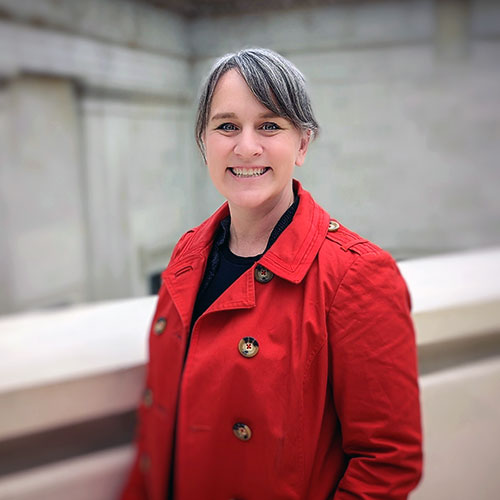When Breanne Grace had the opportunity to study abroad in college, she was naturally drawn to Sweden, where she has connections with her mother’s family. Her mom had another idea.
“She said, ‘You can go visit your family in Sweden anytime. Why don’t you go somewhere you’ll never go again?’” says Grace, an associate professor in the College of Social Work.
That bit of advice took her from her home state of Colorado to Tanzania where she enrolled at the University of Dar es Salaam. She returned to the U.S. for a job in refugee resettlement in San Diego, California, went back to Tanzania and eventually earned a Ph.D. in sociology. She joined the faculty at the University of South Carolina in 2013.
Since 2021, Grace has used her education and experiences abroad as faculty principal of the Carolina International House at Maxcy College, a living-and-learning community of domestic and international students that promotes cross-cultural understanding and creates a space for students with globally-focused interests across academic colleges.
“One of the things I love about Maxcy is that it’s a vibrant place with students from all over the world, from all different backgrounds, with majors from all colleges and departments,” she says. “I love being able to foster creativity and curiosity and connections.”
Now entering the third year of a three-year term as principal, she says things are never boring in the bustling, diverse environment. As she walks in the building, she might see students in pajamas attending one of the general education classes, which are hosted in Maxcy to support study habits and connection among the residents. Students may drop in for coffee or doughnuts during morning office hours with questions about internships, study abroad or career opportunities.

In addition to mentoring students, Grace coordinates a wide variety of activities and opportunities at Maxcy. She may be planning an annual lecture or organizing a professional panel to discuss potential careers. On other days, her to-do list might include ordering board games for the language immersion floors or facilitating a Duolingo league where students compete on the language-learning app. She also collaborates with faculty from colleges and departments across campus as Maxcy associates or guest speakers.
“We bring in faculty in from all majors, so that students get to know them in a lower pressure way,” she says. “When you teach, there's an inherent power dynamic, so students and faculty may not get to know each other the same way they could if they’re having coffee together.”
For instance, a faculty member in the history department, Kay Edwards, trains disaster response dogs and has brought them to meet students. For Halloween, that same faculty member told students ghost stories from medieval France, the topic of a book she is writing. A professor from the Japanese department who has an interest in Japanese feminist horror films organized an in-house small film festival followed by a lecture series.
Grace’s own research concentrates on the intersection of humanitarian aid, immigration status and health, especially asylum and resettlement for East African refugees in the United States. She is also a member of the founding team of the Center on Migration, Policy, Services and Society. The center promotes collaboration among faculty and grad students on immigration research projects across campus as well as with community practitioners.
Her focus on immigration was fostered by studying, working and doing research in Tanzania for a total of eight years, beginning with that study abroad semester at the University of Dar es Salaam. There she nurtured an interest in immigrant experiences that had been piqued during a high school study abroad program in France. After graduation, Grace applied her interest and in-demand language skills – Swahili and French – to land a position working with refugee resettlement. When her husband had the opportunity to travel to Tanzania as a Fulbright Scholar, she was able to transfer and travel with him.
It was during this second stint in Africa that Grace realized she had a passion for research and was awarded a Fulbright Scholarship. She remained in Tanzania another year and then decided to make a career change from the humanitarian aid field and applied to graduate school.
“Now, there’s pretty good internet across Tanzania through cell phone service, but at that time, there was not,” she says. “I applied for grad school from a refugee camp sitting on the hood of my car with a satellite phone hooked up to the battery.”
During her experiences abroad, Grace enjoyed being part of a global community. Becoming the faculty principal at Maxcy College gives her the opportunity to interact with students from all over the world – whether they are seeking a four-year degree at USC or studying abroad for a semester.
“Our international students bring to both our community and to the university their different experiences and perspectives,” she says. “That kind of comparative experience helps our students think broadly about what the world is or what the world could be.”
Next fall, Carolina International House will relocate to a new building on campus where there will be space to expand the language immersion living communities as well as the major floors, where small clusters of students with the same major live and study together. Major floors help with student retention and success by ensuring students have a built-in support system for studying and learning starting on move-in day. Grace is excited about continuing to facilitate an environment where students are enriched through cross-cultural connections.
“Some of our students have lots of international experience, but we also have students who are really interested in the world but might come from backgrounds where they haven't had the opportunity to travel a lot. Some have never left South Carolina,” she says. “We love that we can introduce them to the world just through daily living here.”